|
|
|
Sort Order |
|
|
|
Items / Page
|
|
|
|
|
|
|
| Srl | Item |
| 1 |
ID:
131354
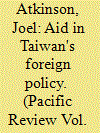

|
|
|
|
|
| Publication |
2014.
|
| Summary/Abstract |
Taiwan's foreign aid policy is largely a response to its China-imposed international isolation. Taiwan provides aid without stringent accountability conditions to countries in Africa, the Americas, and the South Pacific in order to maintain official diplomatic relations in the face of Chinese opposition. Often at odds with this is Taiwan's interest in seeking western support through being seen as a responsible aid donor. Domestic political constraints on Taiwan's aid budget accentuate the tension between these two interests. Taiwan's aid program can be seen as the product of these three competing and enduring pressures - maintaining the count of official diplomatic relationships, improving its international reputation, and containing aid spending.
Taiwan President Ma Ying-jeou's tacit 'diplomatic truce' with China - part of a wider warming of intergovernmental relations across the Taiwan Strait - has reduced significantly the squeeze between these three pressures on Taiwan's foreign aid policy. It has allowed the Ma administration to improve Taiwan's reputation, while maintaining or even reducing its aid expenditure, and still retain the same number of official diplomatic relationships. Nevertheless, the Ma administration has not wanted to alienate recipient governments while the prospects for the diplomatic truce with China remain uncertain. There remains considerable continuity with past practices, and the government's handling of aid as a foreign policy tool is still largely opaque and unaccountable.
|
|
|
|
|
|
|
|
|
|
|
|
|
|
|
|
| 2 |
ID:
131351
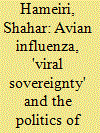

|
|
|
|
|
| Publication |
2014.
|
| Summary/Abstract |
In December 2006, Indonesian Health Minister, Siti Fadilah Supari, shocked the world when announcing her government would no longer be sharing samples of the H5N1 avian flu virus, collected from Indonesian patients, with the World Health Organization, at a time when global fears of a deadly influenza pandemic were running high. For observers of Southeast Asian politics, the decision reinforced the view of the region as made up of states determined to protect their national sovereignty, at almost all costs. This established view of the region, however, generally neglects the variable and selective manner in which sovereignty has been invoked by Southeast Asian governments, or parts thereof, and fails to identify the conditions shaping the deployment of sovereignty. In this paper, it is argued that Siti's action was designed to harness claims of sovereignty to a domestic political struggle. It was a response to the growing fragmentation and, in some cases, denationalisation of the governance apparatus dealing with public health in Indonesia, along with the 'securitisation' of H5N1 internationally. The examination of the virus-sharing dispute demonstrates that in Southeast Asia sovereignty is not so much the ends of government action, but the means utilised by government actors for advancing particular political goals.
|
|
|
|
|
|
|
|
|
|
|
|
|
|
|
|
| 3 |
ID:
131349


|
|
|
|
|
| Publication |
2014.
|
| Summary/Abstract |
Amid growing alarm over the rising atmospheric concentration of greenhouse gases, increasing attention is being given to 'geo-engineering' technologies that could counteract some of the impacts of global warming by either reducing absorption of solar energy (solar radiation management (SRM)) or removing carbon dioxide from the atmosphere. Geo-engineering has the potential to dramatically alter the dynamics of global climate change negotiations because it might cool the climate without constraining fossil fuel use. Some scholars have expressed concern that certain states may be tempted to act unilaterally. This paper assesses the approach that China is likely to adopt towards governance of SRM and the implications this holds for broader international climate negotiations. We survey Chinese public discourse, examine the policy factors that will influence China's position, and assess the likelihood of certain future scenarios. While Chinese climate scientists are keenly aware of the potential benefits of geo-engineering as well as its risks, we find that no significant constituency is currently promoting unilateral implementation of SRM. China will probably play a broadly cooperative role in negotiations toward a multilaterally governed geo-engineering programme but will seek to promote a distinctive developing world perspective that reflects concerns over sovereignty, Western imperialism and maintenance of a strict interpretation of the norm of common but differentiated responsibility.
|
|
|
|
|
|
|
|
|
|
|
|
|
|
|
|
| 4 |
ID:
131355
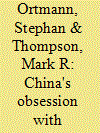

|
|
|
|
|
| Publication |
2014.
|
| Summary/Abstract |
Chinese government officials and academics have shown disproportionate interest in the small city-state of Singapore. The Southeast Asian country with a majority ethnic Chinese population has drawn their attention because it is the only country in the world that combines advanced industrial development with stable one-party rule. Singapore not only seemingly defies Western predictions that modernization will inevitably lead to democracy, but also appears to show that authoritarian regimes may be better suited to achieving societal stability in an Asian context. In particular, the ruling party of the city-state, the People's Action Party, has drawn the attention of conservative Chinese reformists who seek to fill the ideological void that emerged following the decline of Maoist ideology. Reformers in China also derive practical governance lessons from Singapore about fighting corruption, increasing professionalization, and improving responsiveness within the party-state. As such, political learning from the Singapore model must be seen as part of the ongoing process of transformation of the Chinese Communist Party. As a consequence of this learning process, Chinese reformers are using lessons from the Singaporean model as arguments in their efforts to bolster the ideological foundations and strengthen the governance capacity of one-party rule, thus reducing pressures for democratization.
|
|
|
|
|
|
|
|
|
|
|
|
|
|
|
|
| 5 |
ID:
131352
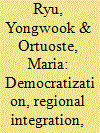

|
|
|
|
|
| Publication |
2014.
|
| Summary/Abstract |
The establishment of the Association of Southeast Asian Nations' (ASEAN) Intergovernmental Commission on Human Rights (AICHR) is extremely puzzling, because many ASEAN members have never been strong supporters of human rights, nor have they been advocates for intervening in the name of human rights. Why did ASEAN members, then, agree to establish the AICHR? We argue that the AICHR is the result of two factors: democratization in key regional countries and the intensifying effort of regional integration in the form of the ASEAN Community project. The former factor engendered key agents for pro-human rights initiatives and set the direction of human rights development within ASEAN. The latter factor weakened the old norms of the ASEAN Way and engendered new regional norms such as good governance and accountability, which were conducive to the development of human rights. It also provided persuasive power based on a shared sense of collective purpose in eliciting agreement from the authoritarian members for the AICHR. We support our argument with the analysis of all ASEAN vision statements and its ministerial meeting statements from 1967 to 2010 as well as our own interviews. The analysis shows that the emergence of new regional norms was closely associated with the development of the ASEAN Community project, and this normative change resulted in a different view of human rights, whose promotion would positively affect regional integration and stability. Our argument suggests a different perspective of a regional human rights mechanism essentially as a regional body reflecting regional norms and values.
|
|
|
|
|
|
|
|
|
|
|
|
|
|
|
|
| 6 |
ID:
131357
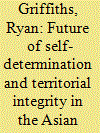

|
|
|
|
|
| Publication |
2014.
|
| Summary/Abstract |
The twentieth century saw the rise of two important and interrelated norms. The first is the norm of self-determination, which advances the right of stateless nations to govern themselves. The second is the norm of territorial integrity, which upholds the principle that political borders should be respected. A consequence of these norms has been an increase in secessionism, a decline in conquest, and a proliferation of states. This paper will examine the development of these norms, their interrelationship, and their prospects for the future. Attention will be given to three important questions: (1) Under what conditions does a norm endure beyond a power transition? (2) How likely is an ascendant China or India to support the norms? (3) What does a power transition and the corresponding support of these norms augur for the future of secession, conquest, and the number of sovereign states?
|
|
|
|
|
|
|
|
|
|
|
|
|
|
|
|
| 7 |
ID:
131358
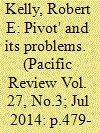

|
|
|
|
|
| Publication |
2014.
|
| Summary/Abstract |
This paper posits four ranked, generic goals of state foreign policy, maps them against the American 'pivot,' and concludes with possible handicaps of that shift. Drawn broadly from realism and liberalism, those abstract goals are as follows: national security, economic growth, prestige among the community of states, and the promotion of cherished national values. Applying this framework specifically to Northeast Asia, the USA, regarding security, is likely to increasingly 'hedge' China, and its North Korean client, with regional allies, off-shore balancing, and a shift toward AirSea Battle. On trade, the USA will continue its decades-long effort to reduce Asian mercantilism by tying Asian traders into multilateral, neoliberal rule sets. Regarding prestige, the 'Beijing Consensus' is a growing challenge to US soft power which the pivot seeks to refute. In addition, on values, the USA will continue to nag especially China to conform to US standards of law and human rights. The USA will continue to push the broad liberalization of Asian polities and economies. The democratic peace and liberal trade are the ideological frame and motivation of the pivot. Nevertheless, significant US handicaps may slow the pivot: American cultural distance from Asia means little public support and understanding of its necessity; strong regional allies will tempt the USA toward offshore balancing on the cheap; and the dire US budget shortfall will reduce the resources necessary to fund it.
|
|
|
|
|
|
|
|
|
|
|
|
|
|
|
|
| 8 |
ID:
131353


|
|
|
|
|
| Publication |
2014.
|
| Summary/Abstract |
Over the past decade there is a growing concern about how state governments could exert political control upon the Internet system. Most explanations on Internet control point to the authoritarian nature of political system. It is true that in general Internet control practices are more evident in politically closed regimes and less so in fully liberal democracies. A clear match between the level of democracy and the degree of Internet freedom, however, could hardly be found in the middle of political regime continuum that contains various sorts of hybrid polities. This paper tries to look beyond the regime factor and identify the major determinants that shape Internet control outcomes in competitive (yet not fully democratic) political systems. It chooses to investigate three Southeast Asian countries, Malaysia, Thailand, and Indonesia, which constitute a clear mismatch between their regime types and the level of Internet control. Pointing out the indeterminacy of regime type, this paper constructs an alternative model that addresses the intensity of online transgressiveness and the capacity of online civil society. While online transgressiveness propels governments to seek Internet control strategies, online civil society represents an inhibiting force, the cohesiveness of which determines the extent to which societal resistance against Internet censorship might succeed.
|
|
|
|
|
|
|
|
|
|
|
|
|
|
|
|
|
|
|
|
|